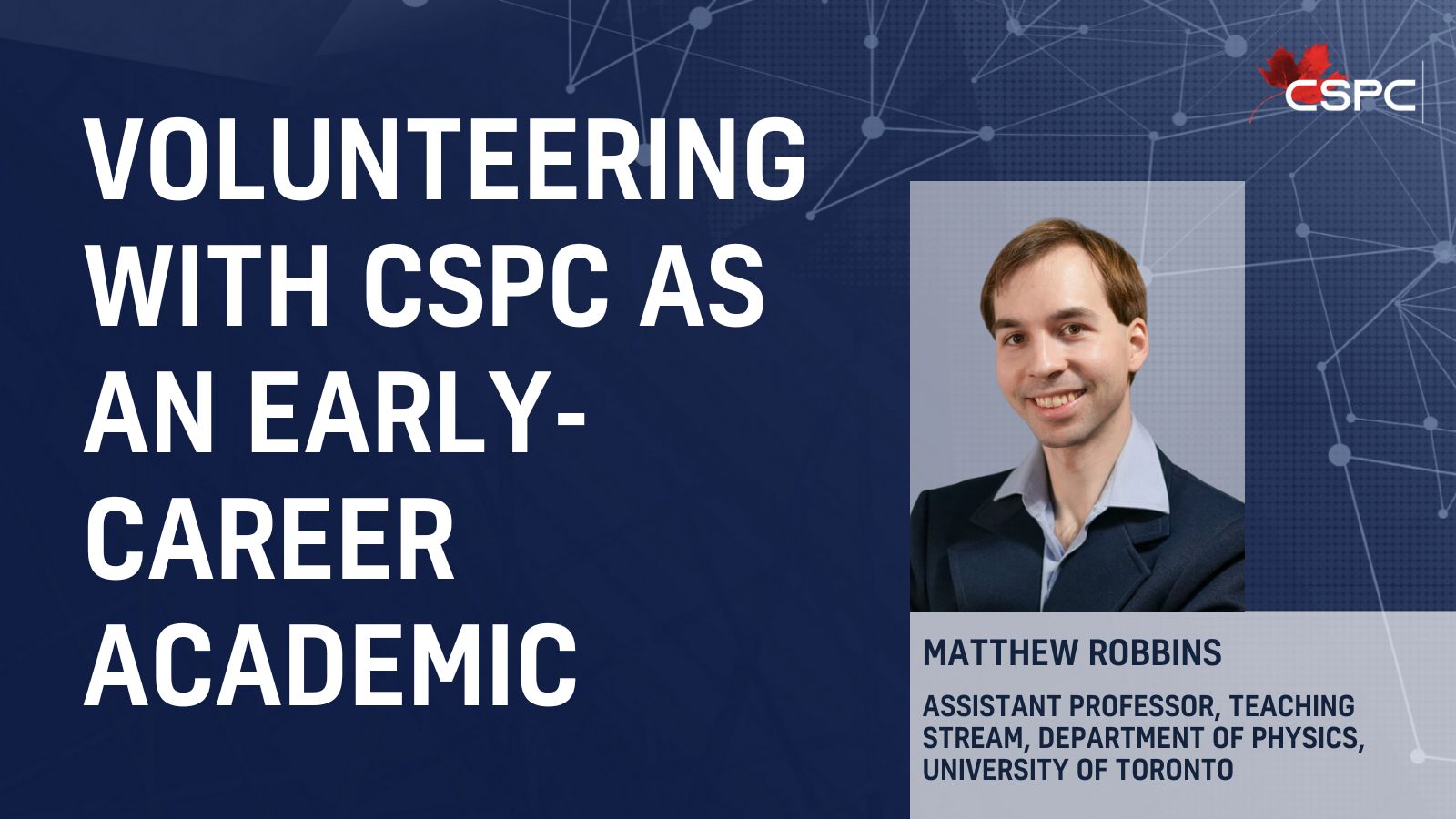Volunteering with CSPC as an Early-Career Academic

Author(s):
Matthew Robbins
University of Toronto
Assistant Professor, Teaching Stream, Department of Physics
Disclaimer: The French version of this text has been auto-translated and has not been approved by the author.
While completing my PhD in Physics at the University of Waterloo (2017-2021), I kept thinking about what would come next. I had always wanted to find an academic position, but given the competition in the academic job market, I was unsure if I would be successful. Moving around every two or three years for a postdoc or other short-term position was unappealing, so I started thinking about other career options that might be available to me.
Around 2018/2019, I was becoming interested in the relationship between science and policymaking. I had attended a talk by the Career Program Manager of the American Physical Society, in which she discussed how physics graduates had good analytical and problem-solving capabilities, though they tended to be missing softer skills related to leadership and interacting with diverse stakeholders. To develop these skill sets, I became involved with graduate student leadership roles at the University of Waterloo. Through these activities, I routinely interacted with students and the departmental/university administration, which improved my understanding of policymaking and stakeholder engagement.
Around the same time, I also learned about the Canadian Science Policy Centre. The more I read about the organization, the more interested I became in it. When I realized that the annual conference was always held in Ottawa, I embraced the opportunity to attend and learn more about science policy in Canada. I consider CSPC 2019 one of the most exciting conferences I have ever attended. Even though I had minimal exposure to science policy, I felt that I could grasp the importance of each of the talks and understand how the main ideas related to the overall policy landscape in Canada.
Immediately following my PhD, I became a sessional lecturer at the University of Waterloo, though I never forgot about my experience at CSPC 2019. I thoroughly enjoyed teaching students and still hoped to find a permanent academic position, though the uncertainty of the job market was always at the back of my mind. In case a permanent position might never materialize, I returned to CSPC in 2022, but this time as a volunteer because I wanted to meet like-minded people, develop new connections and abilities, and better understand how I could use my background and experience to contribute to science policy in Canada. I was also hoping that this experience might be able to open new doors into the science policy world so that I could have a back-up plan in case I was unable to find a permanent academic position.
Since 2022, I have served on five committees: Editorial, Events, Research and Grants (also as co-chair), Evaluations and Reports (also as co-chair), and most recently, Conference Program. When I first applied to be a CSPC volunteer, I wanted to immediately dive in and be part of the Conference Program Committee, as it is the committee that helps organize the Conference. However, given that I was just taking my first steps into science policy, I felt like I did not know enough about the field or about CSPC to be able to be an effective committee member. By 2025, however, I felt a little more knowledgeable about the relationship between science and policymaking (though I still have lots to learn!) and had a better understanding of CSPC, its different activities, and the Conference. Serving on the Conference Program Committee has been a rewarding experience as I now understand the work that is needed behind-the-scenes to put on a successful conference. I helped review conference panel proposals, select successful submissions, and interact with panel organizers.
In 2024, I was lucky enough to secure a faculty position at the University of Toronto. Through volunteering with CSPC, I have met many early-career researchers, scientists, and policy professionals from across Canada, each bringing their own unique perspectives. I have also worked closely with CSPC staff and have formed a good relationship with my fellow co-chairs. My experience at CSPC has improved my grant writing ability and further developed my expertise in managing projects and helping coordinate events. These skills are invaluable to my professional development and will continue to support my growth as I advance in my academic career. I am excited to see other early career professionals take advantage of these opportunities with CSPC as they develop their own network of scientists and policy professionals.

